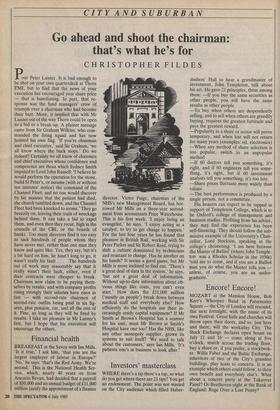Financial health
BREAKFAST at the Savoy with Ian Mills. 'Is it true,' I ask him, 'that you are the largest employer of labour in Europe?' 'No,' he says: 'that's the Red Army. We're second.' This is the National Health Ser- vice, which, nearly 40 years on from Aneurin Bevan, had decided that a payroll of 850,000 and an annual budget of £11,000 million justify the appointment of a finance director. Victor Paige, chairman of the NHS's new Management Board, has bor- rowed Mr Mills on a three-year second- ment from accountants Price Waterhouse. This is his first week. 'I enjoy being an evangelist,' he says. 'I enjoy acting as a catalyst, to try to get change to happen.' For the last four years he has found that pleasure in British Rail, working with Sir Peter Parker and Sir Robert Reid, trying to shift a culture dominated by technicians and resistant to change. Has he another on his hands? It seems a good guess, but Mr Mills is more inclined to find out. 'There's a great deal of data in the system,' he says, 'but not a great deal of information. Without up-to-date information about ob- vious things like costs, you can't even start.' How does the £11,000 million ('mostly on people') break down between medical staff and everybody else? How efficiently do the hospitals use their in- creasingly costly capital equipment? If Mr Smith at Brown's Hospital has a scanner for his unit, must Mr Brown at Smith's Hospital have one too? Has the NHS, like any other monopoly supplier, grown its systems to suit itself? 'We need to talk about the customers,' says Ian Mills. 'It's patients one's in business to look after.'


















































 Previous page
Previous page